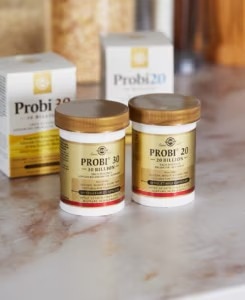Gut Health 101: Probiotics, Prebiotics, & Digestive Enzymes

Key Takeaways:
- Probiotics are living microorganisms that contribute to a healthy microbiome and digestive health.* Probiotics can be found in certain foods or taken as supplements.
- Prebiotics are a type of dietary fiber and exist as food for probiotic bacteria. Prebiotics are not necessary for probiotics to work but can help increase effectiveness.
- Digestive enzymes are non-living proteins that play a key role in helping to break down food so that your body can absorb the nutrients. Digestive enzyme supplements can help support healthy digestion.*
Your digestive health is just one part of a number of systems that make your body run smoothly, and its importance cannot be overstated.
A healthy gut not only improves digestion, but it can support other key functions within the body.
Once you begin the journey towards better digestive health, you’re sure to hear a lot of gut-health-buzzwords along the way: microbiome, digestive enzymes, and of course — probiotics.
But what exactly are probiotics? How do I know if I should take one? And how do I find the right one for my unique needs?
Keep reading to find out.
What are probiotics?
Probiotics are living microorganisms that, when ingested, can help support digestive health.* Probiotics are usually bacteria, but certain types of yeast — such as S. boulardii — can also function as probiotics.
You can get probiotics from supplements or from foods that have been prepared with bacterial fermentation. Examples of probiotic foods include yogurt, kefir, sauerkraut, tempeh, and kimchi.
How do prebiotics and probiotics work together?
Understanding the difference between prebiotics and probiotics may seem confusing at first, but it’s really quite simple. You don’t need to take prebiotics for probiotics to work, but it may help make them more effective.
As mentioned before, probiotics are bacteria that live in your body naturally and some help with the breakdown of food. Prebiotics, on the other hand, don’t contain bacteria. Prebiotics are made up of dietary fiber or carbohydrates that your body can’t digest or are resistant to digestion and act as food for the probiotic bacteria in your intestine.
Prebiotics help bacteria grow. The use of prebiotics and probiotics together supports a more diverse microbiome. When a food source contains both prebiotics and probiotics, the combination is sometimes called synbiotic. Foods that are synbiotic include cheese, kefir, certain types of yogurt, sauerkraut, and kimchi.
Probiotics, whether from supplements or food, are all part of a bigger picture: the microbiome.
What exactly is a microbiome?
Imagine a bustling city on a Monday morning: the sidewalks flooded with people and the streets packed with cars rushing to and fro. Now picture this on a microscopic level, and you have an idea of what the microbiome looks like in your body.
Each person has a completely unique network of microbiota that is determined by their DNA. Your body has trillions of microorganisms called microbiota or microbes. These include bacteria and fungi. If you’re healthy, these microorganisms coexist peacefully, most of them found in the small and large intestines. Even though it’s not technically an organ, the microbiome is labeled an honorary organ because it plays so many key roles in the daily operations of your body.1
Probiotics naturally contain live bacteria and can help support a healthy microbiota.
What are the benefits of probiotic supplements?

Taking a probiotic supplement can offer huge benefits to both your digestive system and your overall health.*
Some of the health benefits of probiotics include adding to gastrointestinal microflora, supporting the immune system, and helping alleviate occasional abdominal discomfort.2 Probiotics are not laxatives, so they won’t necessarily make you go to the washroom, but they can support a healthy digestive system.*
Solgar® Probi® 20 Billion and Solgar® Probi® 30 Billion provide your gut with good bacteria and help alleviate abdominal discomfort associated with occasional gas and bloating.* Solgar® Probi® 30 Billion is also suitable for women of child-bearing age to improve iron absorption.*
How to choose the right probiotic for you
Not all probiotic supplements are made equal, and choosing a well-researched, trusted probiotic is crucial to feel the results for your digestive system.*
To be a true probiotic, a product must contain live and active bacterial cultures, which should be indicated on its packaging. Some of the most researched strains of probiotics with evidence-based support come from a species of Lactobacillus, Bifidobacterium (bacteria), and Saccharomyces boulardii (yeast).3
Solgar® Probi® 20 Billion and Solgar® Probi® 30 Billion use a patented, clinically-studied strain of Lactobacillus plantarum 299v that has been researched for over ten years.
Probiotic supplements
SOLGAR® PROBI® 20 BILLION
Solgar® Probi® 20 Billion delivers 20 billion live cultures to your gut with every serving. These naturally occurring active cultures deliver effective support for your digestive health.* One probiotic capsule taken daily helps alleviate occasional gas, bloating, and abdominal discomfort.* It also helps colonize your gut with good bacteria.*
Solgar® Probi® 30 Billion
Solgar® Probi® 30 Billion includes 30 billion live cultures in each capsule, and features a patented, clinically-studied strain of Lactobacillus plantarum 299v that supports your digestive health.* One capsule a day helps you maintain good gut and bowel health.*
Probi 30 Billion is also resistant to stomach acid and stays intact until it reaches your gut, where it’s needed most. It is also suitable for women of childbearing age to improve iron absorption.*
SOLGAR® ADVANCED 40+ ACIDOPHILUS
Solgar® Advanced 40+ Acidophilus Vegetable Capsules help support a healthy digestive system by offering a variety of beneficial microorganisms, including Lactobacillus acidophilus, Lactobacillus rhamnosus, Lactobacillus paracasei, Bifidobacterium lactis, and Streptococcus thermophilus. Each serving is gluten-free and dairy-free.
SOLGAR® ADVANCED MULTI-BILLION DOPHILUS®
Solgar® Advanced Multi-Billion Dophilus® Vegetable Capsules help promote the healthy functioning of the intestinal system and support a healthy immune system.* Each serving is a source of Lactobacillus acidophilus, Bifidobacterium lactis, Lactobacillus paracasei, and Lactobacillus rhamnosus, beneficial microorganisms that act as friendly bacteria provided to the digestive system.*

What are digestive enzymes?
Probiotics and digestive enzymes both support a healthy digestive system, but they’re not the same. Probiotics are living microorganisms that live in your gut and help balance your gut microbiome.* You can think of them as little helpers that help maintain harmony in the gut’s ecosystem. On the other hand, digestive enzymes are non-living proteins that help speed up chemical reactions in your digestive system.* They play a key role in helping to break down food so that your body can absorb the nutrients.*
When your digestive system is functioning properly, it naturally produces enough digestive enzymes.
However, in some cases, the body does not produce enough of these enzymes, and the digestive system suffers as a result. Thankfully, digestive enzyme supplements are a great way to help your body break down food better and support healthy digestion.*
Digestive Enzyme Supplements
SOLGAR® COMFORT ZONE DIGESTIVE COMPLEX
Solgar® Comfort Zone Digestive Complex offers 11 naturally derived enzymes and helps encourage more efficient and thorough digestion.* Each serving helps support the body’s natural digestive process so that you worry less about avoiding your favorite foods and start eating what you enjoy.*
other related supplements
SOLGAR® PSYLLIUM HUSK FIBER
Psyllium husk fiber comes from the husks of Plantago ovata plant’s seeds. Psyllium husks are a source of soluble fiber and a healthy addition to your diet.* Solgar® Psyllium Husk Fiber is a premium supplement and is non-GMO, vegan, gluten-free, dairy-free, kosher, and halal.
You can also click here for more supplements that aid healthy digestion.
Get the latest updates and exclusive deals when you sign up for our newsletter!
Summing it up
Feeling bloated, gassy, or experiencing abdominal discomfort can quickly ruin your day and its always important to make sure you’re proactively giving your gut the support it needs. Prebiotics, probiotics, and digestive enzymes are all great ways to support better digestive health.* It is important to remember that not all probiotic supplements are created equal, and finding a well-researched strain will make all the difference in feeling the results. Finding the right digestive supplements for you can help promote better gut health and make eating enjoyable again.*
*These statements have not been evaluated by the Food and Drug Administration. These products are not intended to diagnose, treat, cure or prevent any disease.
The information provided on this site is intended for your general knowledge only and is not a substitute for professional medical advice or treatment for specific medical conditions. Always seek the advice of your physician or other qualified healthcare provider with any questions you may have regarding a medical condition. The information on this website is not intended to diagnose, treat, cure or prevent any disease. Never disregard medical advice or delay in seeking it because of something you have read on the Solgar®site.